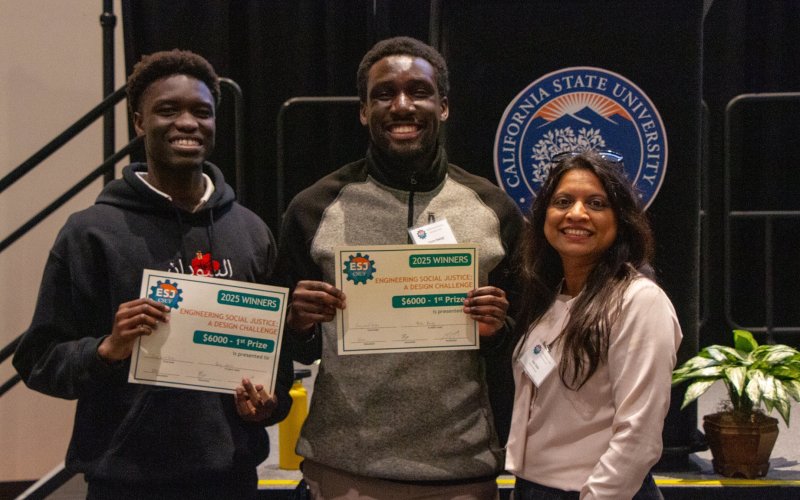
Student teams from Cal State Fullerton’s College of Engineering and Computer Science gathered on March 19 to participate in the annual Engineering Social Justice competition for $12,500 in seed grant funds. The event featured a poster session and a keynote address from the winners of the 2024 competition. The top nine teams presented their ideas to a panel of five faculty and industry experts.
The winning teams included:
First-place team: Shaq and Kobe
Faculty adviser: Jaya Dofe, associate professor of electrical and computer engineering
Title: “Clean Air for All: Air Purification System for Vulnerable Communities”
Project description: Low-income communities often face respiratory health risks due to inadequate heating, ventilation, and air conditioning systems, a problem worsened by natural disasters like California wildfires. Poor air filtration disproportionately impacts underserved populations, increasing exposure to harmful pollutants and exacerbating respiratory conditions.
This research focuses on developing an affordable, portable air purification system to improve indoor air quality. Equipped with HEPA, a type of air filter, and activated carbon filters, the device effectively removes wildfire smoke, dust, pollen and bacteria. It features replaceable filters similar to household HVAC systems but in a smaller, cost-effective form. Integrated with sensors —including smoke, carbon dioxide, and air quality monitors like the RRH62000 — the system ensures real-time monitoring.
This device enhances air quality and promotes environmental justice by addressing filtration gaps in low-income housing. This solution supports health equity and mitigates the disproportionate effects of poor air quality on marginalized communities.
Second-place team: The CS Witches (DWIJ)
Faculty adviser: Wenlin Han, associate professor of computer science
Title: “Hex Cam”
Project description: This group chose to address home security in low-income neighborhoods, where break-ins, package thefts, and hit-and-run incidents are common. The most common deterrent for these crimes is setting up security systems outside a resident’s home. However, many low-income families struggle to afford and sustain these systems. To solve this issue, students plan to create and distribute low-cost security cameras made from recycled materials as an alternative to commercial home security systems. The camera will function alongside an app and use minimal plastic to make it more environmentally sustainable. Students aim to make them accessible to everyone in impoverished communities. The design will include essential features of traditional security cameras, such as a light, live view camera and a sturdy structure. Additionally, the app will allow users to connect with neighbors to share information about local dangers. The students hope will help families feel safer in their homes.
Third-place team: The Justice League
Faculty adviser: Mira Kim, assistant professor of computer science
Title: “Dignity Plug-in — Build for Everyone in Mind”
Project description: Millions of people with disabilities face challenges using and creating apps because DIY app-building platforms lack accessibility features. This leaves many individuals unable to fully participate in the digital world. The students’ solution, “Dignity Plug-in,” is designed to change that by seamlessly integrating accessibility tools into existing app builders.
This plug-in offers features such as screen reader support, voice navigation, high-contrast display options, and customizable settings to accommodate different needs. Additionally, it provides short instructional videos that guide users through tasks step by step, making app creation more accessible for everyone.
By making these features easy to implement, students help DIY app builders expand their reach and create a more inclusive environment. Their goal is to ensure that anyone, regardless of ability, can design and use apps without barriers. With accessibility built in from the start, they can make technology work for everyone.
Best poster: Fireflies
Faculty adviser: Sagil James, professor of mechanical engineering
Title: “Disaster Response Bias Detector”
Project description: Disasters don’t discriminate, but disaster response often does. Marginalized communities — whether by race, income or disability — face disproportionate impacts and systemic biases hinder equitable aid distribution. The team’s AI-driven detector ensures fair, effective disaster relief by identifying and mitigating biases in real time.
Using machine learning and big data, it audits aid distribution, analyzing disparities in food, water, medical supplies and shelter allocation. It flags biases through real-time data from relief agencies, satellite imagery and community reports. To prevent reinforcing biases, the model undergoes continuous validation with fairness-focused algorithms.
Beyond detection, the system provides actionable recommendations for equitable resource distribution and logistics optimization. A transparency dashboard enables stakeholders to track response efforts, while a crowdfunding feature empowers communities to mobilize aid. In an era of escalating crisis, this AI-powered solution enhances transparency, accountability and resilience, ensuring every resource reaches those in need.